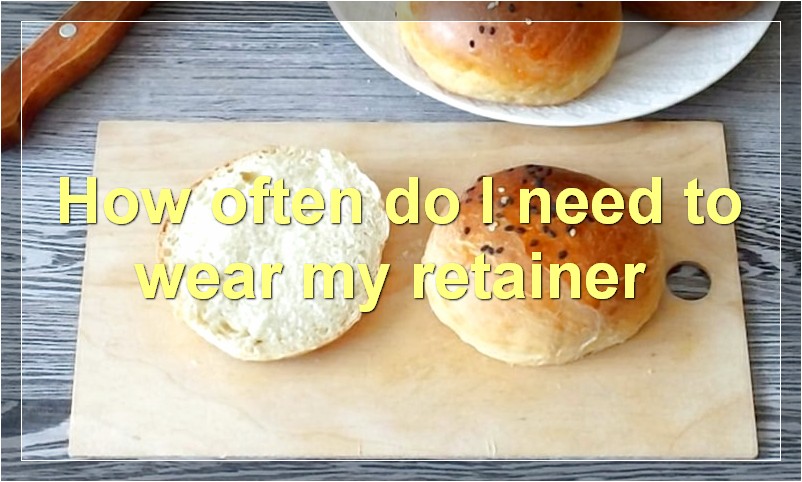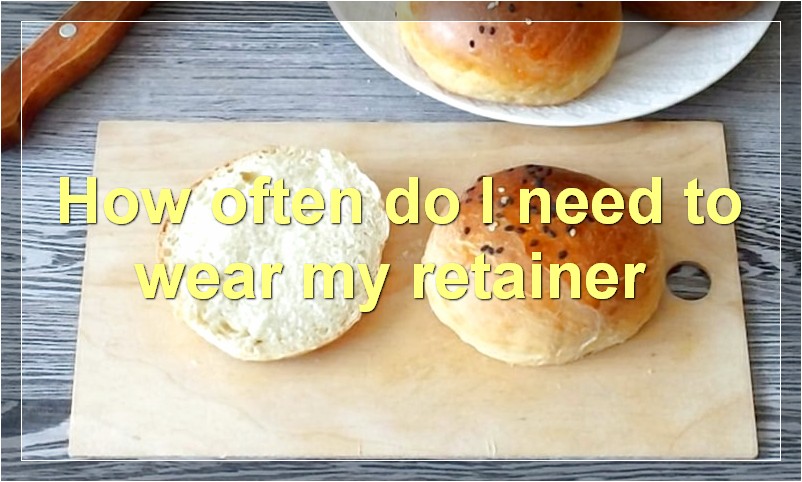If you’ve had braces, you know the drill: Wear your retainer or your teeth will start to shift. But how long do you have to keep wearing it, exactly?
How often do I need to wear my retainer?

If you had braces as a teenager, you probably wore a retainer for some time after your braces were removed. You might have even worn a retainer through college. But now that you’re an adult, do you still need to wear a retainer? The answer is maybe.
Here’s what you need to know about retainers and whether or not you should still be wearing one:
What is a retainer?
A retainer is a custom-made mouthpiece that helps keep your teeth in alignment. It is usually made of metal wires or clear plastic and fits snugly over your teeth.
Why do people wear retainers?
The main reason people wear retainers is to keep their teeth from moving back to their pre-orthodontic treatment position. In other words, retainers help maintain the new and improved position of your teeth.
How long do I need to wear my retainer?
The amount of time you need to wear your retainer will vary depending on how much your teeth have moved and how long you wore braces. In general, however, most people need to wear their retainers for at least six months to a year after getting braces. If your orthodontist thinks you need to wear your retainer for a longer period of time, they will let you know.
Can I stop wearing my retainer once my teeth are straight?
Ideally, no. Just because your teeth look straight doesn’t mean they’re locked into place. Think of it this way: would you stop wearing your seatbelt once you reach your destination? Probably not. It’s the same with retainers – just because your teeth are where they’re supposed to be doesn’t mean they’ll stay there without being held in place.
How often should I wear my retainer?
For the first few months after getting braces, you’ll likely need to wear your retainer all the time (except when eating, brushing, or flossing). After that, you can probably get away with wearing it just at night. It’s important to wear your retainer as often as your orthodontist recommends because if you don’t, your teeth may start to move out of place again.
Do I need to clean my retainer?
Yes! Just like anything else that goes in your mouth (braces, dentures, etc.), retainers can collect bacteria and plaque if they’re not cleaned regularly. Be sure to brush your retainer every day with toothpaste and water. You can also soak it in denture cleaner or mild dish soap. And be sure to clean it before putting it back in your mouth!
Taking care of your retainer is important, but so is taking care of your teeth and gums. Be sure to brush twice a day, floss daily, and see your dentist regularly.
What happens if I don’t wear my retainer?
If you don’t wear your retainer, your teeth will slowly start to move back into their original positions. You may also experience some discomfort and difficulty eating.
Can I still eat with my retainer in?
Yes, you can still eat with your retainer in, but there are some things you should keep in mind. First of all, avoid sticky and hard foods as they can damage or break your retainer. Secondly, cut your food into small pieces so that you don’t have to bite down too hard. And lastly, brush your teeth after eating to avoid getting food stuck in your retainer.
How do I care for my retainer?
If you’ve been fitted with a retainer, congratulations! You’re on your way to having straighter teeth. In order to maintain your new smile, it’s important to take care of your retainer. Here are some tips on how to keep your retainer clean and in good condition.
1. Rinse your retainer with water after eating. This will help remove any food particles that may be stuck to it.
2. Brush your retainer with a toothbrush and toothpaste at least once a day. Be sure to use a non-abrasive toothpaste so as not to damage the retainer.
3. Soak your retainer in a denture cleaner or retainers cleaning solution at least once a week. This will help kill any bacteria that may be growing on it.
4. Bring your retainer with you to your regular dental checkups so the dentist can make sure it’s still fitting properly and isn’t causing any damage to your teeth.
By following these simple tips, you can help ensure that your retainer stays clean and in good condition, and that your teeth remain straight and healthy for years to come!
What is the best way to clean my retainer?

It is important to keep your retainer clean, as it will help to prevent tooth decay and gum disease. There are a few different ways that you can clean your retainer.
One way to clean your retainer is to soak it in a denture cleaner. You can find denture cleaners at most drug stores. Follow the instructions on the package for how long to soak your retainer.
Another way to clean your retainer is to brush it with toothpaste and then rinse it off with water. You can also use mouthwash to rinse your retainer.
If you wear your retainer all the time, you should clean it every day. If you only wear it occasionally, you can clean it once a week.
Will my retainer always fit me?
Don’t worry, we’ve all been there. You get your braces removed and are given a retainer to wear. You put it in your mouth and… it doesn’t fit. Suddenly, all your dreams of having perfect teeth are dashed. But don’t despair! In this article, we’ll give you the lowdown on retainers and whether or not they always fit.
When you get your braces removed, your orthodontist will give you a retainer. A retainer is a custom-made appliance that helps your teeth stay in their new, straight position. You will need to wear your retainer as directed by your orthodontist. This usually means wearing it for at least 22 hours a day for the first few months, then reducing the amount of time you wear it as your teeth settle into their new position.
Your retainer will feel strange at first, and it may take some time to get used to wearing it. However, it is important to wear your retainer as directed by your orthodontist in order to maintain your new smile.
One common question we get from patients is: will my retainer always fit me? The answer is: maybe not. As you age, your teeth can shift and move out of their new, straight position. This is why it is important to wear your retainer as directed by your orthodontist, even after your treatment is completed. Wearing your retainer as prescribed will help to ensure that your beautiful new smile lasts a lifetime.
If you have any questions about retainers or other orthodontic appliances, please contact our office. We would be happy to help you!
Can I sleep with my retainer in?
Yes, you can sleep with your retainer in, but there are some things you should know before doing so. Retainers are designed to keep your teeth in their new, straight position. But, if you wear your retainer while you sleep, your teeth may gradually shift back to their old position.
Wearing your retainer at night is the best way to keep your teeth from shifting. But, if you can’t wear your retainer at night, try to wear it as much as possible during the day. And be sure to take it out when you eat or drink anything other than water.
If you’re not sure whether you should sleep with your retainer in or not, talk to your orthodontist. They will be able to give you the best advice for your individual situation.
How long does a retainer last?
A retainer is a thin piece of plastic or metal that is custom-made to fit snugly over your teeth. It helps to keep your teeth in alignment (straight) and can be used to treat a number of different dental problems. Depending on your individual case, you may need to wear your retainer for just a few hours each day or even all day long.
Retainers are usually made from acrylic (plastic) or metal. They fit over the front surface of your teeth and are held in place by wires that clip onto your molars (back teeth). Metal retainers are usually less visible than clear plastic retainers, but they can cause irritation to your gums.
You will need to see your orthodontist every few weeks so they can check that your retainer is fitting properly and that your teeth are continuing to move into the correct position. It is important to wear your retainer as prescribed by your orthodontist, as failure to do so could result in your teeth moving back out of alignment.
Most people only need to wear their retainers for a few years, but in some cases, you may need to wear them for life. Your orthodontist will be able to advise you on how long you will need to wear your retainer for.
How much does a retainer cost?
When it comes to dental retainers, the cost will vary depending on the type of retainer and the dentist you see. But in general, expect to pay anywhere from $500 to $2,000 for a retainer. And that’s not counting the cost of initial fittings and follow-up appointments.
So why do retainers cost so much? Let’s take a closer look.
The Different Types of Dental Retainers
There are three main types of dental retainers:
1. Removable Retainers
As the name suggests, removable retainers can be taken out and put back in as needed. They’re usually made of clear plastic or wire and fit snugly over your teeth. Removable retainers are the most affordable type of retainer, costing anywhere from $500 to $1,000.
2. Fixed Retainers
Fixed retainers are just that – fixed in place. They’re usually made of metal wire that’s glued to the back of your teeth. Since they can’t be removed, fixed retainers require more careful cleaning and can be more difficult to get used to than removable retainers. They also tend to be more expensive, costing anywhere from $1,000 to $2,000.
3. Custom-Made Retainers
Custom-made retainers are exactly what they sound like – they’re made specifically for your mouth and teeth. They’re usually made of clear plastic or wire and fit snugly over your teeth like removable retainers. Custom-made retainers are the most expensive type of retainer, costing anywhere from $1,500 to $2,000.
What’s Included in the Cost of a Dental Retainer?
The cost of a dental retainer will usually include:
• The cost of the retainer itself
• The cost of initial fittings and follow-up appointments
• The cost of X-rays (if needed)
• The cost of oral exams (if needed)




